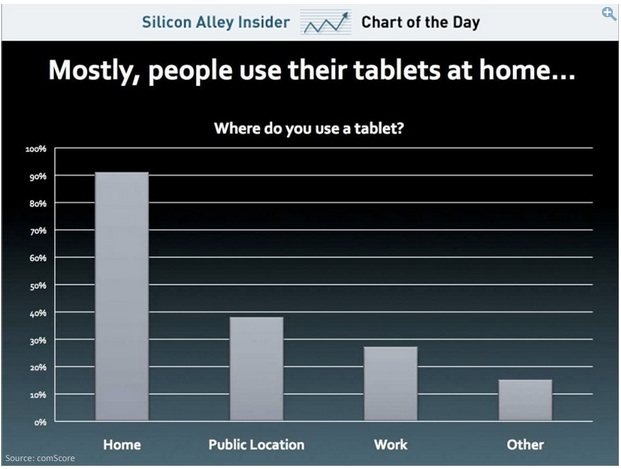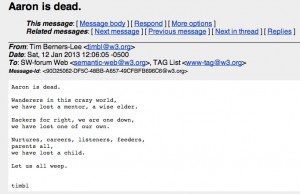I’ve just been reading “Why I write”, a thoughtful post by Dave Winer about why he blogs and what’s happened to him as a result. As a long-time reader of Scripting News, I’ve often been struck by the anger, abuse and hostility he attracts, for reasons that have always baffled me. Dave is opinionated and quirky, sure, but he’s also rational, thoughtful, decent and humane. In fact I’ve often seen parallels between his blogging and that of the late Aaron Swartz — the same lack of pretentiousness, for example, and the same willingness to admit to ignorance, difficulty or failure.
In his post, Dave writes about the abuse he has attracted and how he has had to learn to live with it.
So when someone gets on a soapbox and starts trying to rev up a crowd to hate me, and when they lie to do it, I have to learn not to give that any weight. What I do now is ask a friend to have a look and tell me what they see. Since the ranting isn’t about them, they won’t take it personally. If they say it’s something I should pay attention to, I would — but they never do. The most recent time it happened, a friend came back and said the person is a sadist. But my mind still circles around the abuse. I have a hard time not thinking about it. So what do I do? Write about it, of course. Now it’s on the web, and hopefully out of my way.
One more thing. I remember being at a conference, chatting with someone and I saw at the other end of the room someone who had been a friend but had started trashing me on the Internet. I excused myself and walked over to the guy and sat down next to him, and asked why he was doing it. He started repeating the nonsense he was saying online. But I didn’t think he really believed it, so I pressed him and asked why he wasreally doing it. He said he had cancer, and was in chemo, and was in a lot of pain. I felt sick myself in that moment. I said you know that’s terrible, but it’s no reason to do and say things that hurt me, and make me feel bad. We all have our struggles. Me too. He agreed, and we’re friends again, but now when I see him online, I can’t forget how used I was, and why, and the pain comes back, his pain and mine. This really sucks.
It does. But it’s very common online. Just look at the comments under most prominent publications, or at any of those that allow anonymous commenting. And it makes me want to ask: why do people behave like this? Is it really the case that the world is full of angry, bitter, envious, bigoted people? And is the Net somehow responsible for the tsunami of bile? Does cyberspace have a fatal attraction for people of a particular disposition or mentality? Or is it just that humans have always been like that, but until recently lacked the technology — or, more accurately — the medium that would enable them to broadcast their vituperative anger to a wider audience than just their immediate social circle?
My hunch is that it’s the latter — in other words that we’re up against a harsh truth about human nature. At any rate, that’s the argument I’ve generally used against technophobes who blame the Net for the supposed pandemic of pornography that they claim is engulfing us. (Because I write about the Net, and once wrote a history of the network, people seem to hold me personally responsible for what they see as its deficiencies!) My case is that if there is a lot of porn on the Net then doesn’t that say more about humans than about technology? For if people weren’t obsessed with sex then surely the ‘demand’ for porn would decline, and with it the supposedly abundant online supply? On this logic, blaming the Net for pornography is the equivalent of shooting the messenger who brings bad news about human nature. And doesn’t the same apply to the phenomenon of online bile?
I suppose a philosopher would say that the abusiveness of much online commenting is really a symptom of the fact that most people don’t know much about logic and even less about how to construct an argument. This view ignores the difficulty that conflicting value systems are what Thomas Kuhn called “incommensurable”: that is to say, there exists no independent logical framework that would enable us rationally to assess the relative merits of different values. There’s no way of convincing someone that Keats is a greater poet than Dylan, say; or that Bach is greater than Beethoven or Mozart. But even when online disagreements are about factual issues, the inability — or unwillingness? — to engage in rational argument is deeply frustrating.
It also makes one wonder about a bigger, but related, issue — whether or not the Net is enlarging what Jurgen Habermas called the “public sphere”. I used to think that it would inevitably have this effect. Now I’m not so sure. And I have a hunch that Dave Winer isn’t sure about it either.



